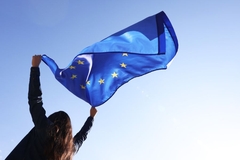UN INC-2: International business coalition calls for reduced plastics production

30 May 2023 --- As delegates descend upon Paris, France, to negotiate a legally binding global treaty on plastic pollution, the Business Coalition for a Global Plastics Treaty convened by the Ellen MacArthur Foundation (EMF) and the World Wildlife Fund (WWF) is underscoring the need for a circular economy with global outcomes focused on three critical areas identified as reduction, circulation and prevention.
“We hope that this second round of negotiations will get into detail because we need to work at pace if a text is to be agreed by 2025,” says Ed Shepherd, Unilever’s senior global sustainability manager and lead representative in the Business Coalition.
“The options paper published by the United Nations Environment Programme [UNEP] – to be discussed in Paris – is incredibly encouraging and includes many of the elements we’ve been calling for as a Business Coalition, like reduction, circulation and prevention.”
At the second round of Intergovernmental Negotiating Committees (INC) discussions, authorities plan to discuss the core elements of the treaty, including objectives, scope and means of implementation. The draft legal text dubbed “zero draft” will form the basis of future negotiations.
With over a hundred organizations, including Unilever, Essity, L’Oreal, L’Occitane, Kimberly-Clark and Colgate Palmolive, the business coalition calls for a treaty that levels the playing field and prevents a “patchwork of disconnected solutions.”
 Unilever is attending the negotiations in Paris with the Business Coalition (Image credit: Unilever).Business and investors’ perspective
Unilever is attending the negotiations in Paris with the Business Coalition (Image credit: Unilever).Business and investors’ perspective
The coalition aims to give businesses, associations, non-profits and financial institutions a voice in the negotiation. The critical areas for consideration, firstly, include reducing plastic production and use through a circular economy approach, focusing on eliminating plastics that have high environmental leakage rates and decoupling from fossil-based virgin resources.
“Under the treaty, binding criteria and timelines should be established for phasing down or phasing out the use of problematic plastics and additives in specific applications. As part of this effort, we must ensure chemicals and pollutants that pose a risk to human health and nature are prohibited or restricted,” it states.
It also recommends circulating all plastic items that cannot be eliminated, keeping them in the economy through developing collection and processing infrastructure and well-designed Extended Producer Responsibility (EPR) schemes.
“Defining common principles and criteria is key for implementing well-designed and effective Extended Producer Responsibility policies that require all industry players who introduce packaging, and other short-lived products to the market, to fund their after-use collection and treatment,” it emphasizes.
“Informal waste workers play an important role in collecting, sorting, and recycling plastic waste. The treaty must protect and respect their livelihoods, their health and their human rights as it enables a safe and just transition to a circular economy.”
Moreover, according to the coalition, prevention and remediation of hard-to-abate plastic leakage into the environment, including through robust waste management practices and tackling legacy pollution, is necessary.
“To be successful, the instrument must adopt a broad scope, covering both macro- and microplastics and addressing all sources and pathways of plastic pollution into the natural environment,” the coalition details.
“The core provisions in the treaty need to address, as a priority, plastic applications with high emissions and those that are at high risk of leaking into the environment, including products and packaging that become waste very quickly. Additional sector-specific work programs could be defined in the treaty but developed later via the governing and potential subsidiary bodies.” The second round of negotiations for a global plastic treaty is underway in Paris, France.
The second round of negotiations for a global plastic treaty is underway in Paris, France.
Call to action
To draft a practical legal text that sets the right enabling conditions to scale circular economy, the Business Coalition for a Global Plastics Treaty believes INC should include the following key elements:
The treaty must set clear goals, targets, and obligations with a sense of urgency.
Furthermore, the coalition says that it “must define a comprehensive and coordinated set of upstream and downstream policy measures,” including a timeline for the phasing-out of problematic plastics, harmonized regulatory and financial incentives, mechanisms to ensure dedicated, ongoing and sufficient funding for the after-use collection and treatment of plastic and provisions to protect and respect the livelihoods, health, labor and human rights of all people involved in the value chain.
Moreover, the treaty must include instruments to support the implementation and monitoring of progress at national, regional and global levels.
This includes, according to the draft text, the supporting policy impact assessment, strengthening accountability of governments and businesses, ensuring countries’ effective participation, and improving transparency on plastic flows through harmonized monitoring to track progress toward the implementation of circular economy solutions, which can be done by using standard rules on data and information sharing across the value chain.
By Radhika Sikaria












